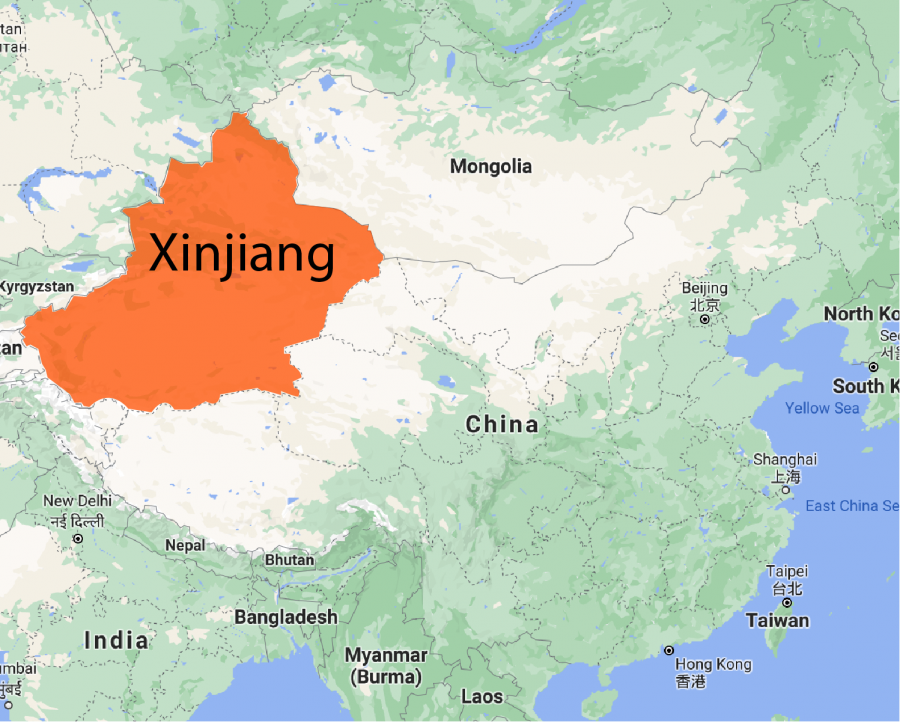Opinion: We must act to stop Uighur internment and forced labor in China
The Chinese government has been forcing millions of Uighurs into reeducation camps in the Xinjiang region and has received little international backlash.
January 12, 2021
Barbed wire, surveillance, torture and religious conformity are what 180 human rights groups called the “largest internment of an ethnic and religious minority since World War II.” Innocent Uighur families are stripped from their homes and detained in concentration camps for “re-education” and forced labor in China.
The Uighurs (also spelled Uyghur) are a Muslim Turkic ethnic group from the Xinjiang autonomous region in northwest China. Xinjiang is home to 11 million Uighurs. The Chinese government is suppressing and exploiting the Uighurs by claiming they have extremist views that are a threat to security and require “re-education.”
The Uyghur Human Rights Project estimates that nearly 1.8 million Uighurs and other members of Muslim minorities have been confined, stripped of their culture and brainwashed in detention camps. They suffer from torture, separation from their families and interrogation. Moreover, they have mandatory Mandarin and ideological training that deprives them of their religion. Many Uighurs are also subjected to forced labor in factories.
Americans are buying products made by the victims of these horrendous human rights violations. If you’ve bought a cotton shirt, there is a 20% chance that it came from Xinjiang, where Uighur forced labor is pervasive. Americans should not purchase items produced from Xinjiang as it is incredibly immoral.
Additionally, 84% of China’s cotton output comes from Xinjiang. The Guardian reports that China is the biggest supplier of cotton products globally, so most of our cotton products come from supply chains that use Uighur forced labor. Isn’t it deplorable how we are contributing to the plight of the Uighurs?
In a letter to the United Nations Human Rights Council, 22 countries condemned the Chinese government’s acts, while 37 countries defended China’s inhumane actions. The U.S. condemned China at the United Nations General Assembly and named the situation a “horrific campaign of oppression.” With few countries on their side, the Uighurs need people to take action now.
Deputy Assistant Secretary of State David Feith noted that aspects of this disaster recall the Holocaust. The world stood by and watched those terrible events unfold. We, especially as a Jewish community, cannot be hypocritical and do the same with the situation in Xinjiang.
The phrase “Never Forget” associated with the Holocaust applies to the Uighur crisis, too. By remembering what happened in those times, we must force an end to these humanitarian crimes.
“The Jewish angle of global efforts in supporting Uighurs and bringing the perpetrators to justice is existential,” Movement Coordinator and co-founder of Jewish Movement for Uyghur Freedom Amitai Abouzaglo said. We cannot change the past, but we can prevent history from repeating itself by buying from stores that do not use Uighur forced labor.
The Uyghur Forced Labor Prevention Act would prohibit the imports of certain goods made with Uighur forced labor. It would also force U.S. importers to inspect supply chains in Xinjiang and possibly stop using Chinese suppliers. The legislation passed the House of Representatives in September and will likely pass in the Senate in the future.
Several major companies, such as Nike and Coca-Cola, which have supply chains in the Uyghur Forced Labor Prevention Act, are targeting this bill, attempting to lessen the severity of this act. Lobbyists claim that the legislation could cause chaos amongst supply chains. These companies are wrongfully valuing cheap labor over fundamental human rights, making it absolutely immoral for us to continue purchasing these items.
Nike stated that they do not source any products from Xinjiang, yet the Australian Strategic Policy Institute revealed that over 7 million Nike shoes are made each year in Xinjiang.
China has ties worldwide to universities, businesses, research labs and even the U.S.’ stock market. China needs these ties with Western countries for trade, technology and diplomatic relations. If the U.S. were to curtail these benefits, it would take a substantial economic, strategic and technological toll on China.
The U.S. should take advantage of China’s dependency and leverage these resources to stop the Uighurs’ internment by denying them these benefits.
Change can happen if we pass the legislation, stop buying from these companies and encourage other countries to follow suit.









Silvia Eschenlauer • Mar 12, 2021 at 3:01 pm
Excellent article!